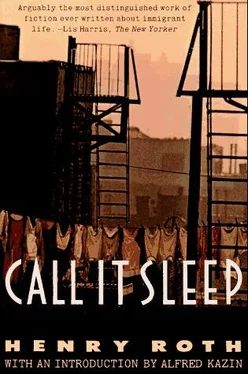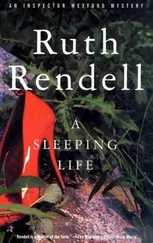“Will you get out that old blanket,” his father resumed, “so if it does freeze tomorrow, I’ll have something to wrap my knees in. This sudden cold seems to crack one’s bones open to the marrow.”
“Yes, of course,” solicitously. “Don’t you want to take your shoes off?”
“No.”
It was curious to David what a subtle difference there was between his father’s brusqueness as a milkman and his brusqueness as a printer. The former seemed to be merely the result of weariness on a naturally high-strung temperament; the latter, the result of strain, of inner maladjustment. His brusqueness now was infinitely less dangerous to those about him.
“This corn-meal is ready,” said his mother. “And after that some tea?”
He grunted, threw his arms back over the shoulder of his chair and watched her ladle out the boiled cornmeal into a bowl.
“Some jam.”
“I’m bringing it.” She set a jar of home-made strawberry preserves on the table.
“This is what I ate,” he smeared the deep, red jam on the corn-meal, “when I was a boy.”
David was waiting to hear his father say just that. He always said it when he ate corn-meal mush, and that was one of the few facts that David had ever learnt of his father’s boyhood.
“I was thinking,” he continued between cooling gusts at the smoking spoon. “It came to me while I was crossing a roof.”
“I wish you didn’t have to cross them!”
“Don’t fret about what you know nothing of,” he waved his hand at her curtly. “I don’t pretend to be a mountain-goat. I merely climb over walls, I don’t leap alleyways. Besides, it isn’t the roofs that trouble me, it’s who may be on them. And now that I’ve told you this for the tenth time, where was I?” He put down his spoon and looked at her perplexed. “There’s nothing like good, womanly worry to beat the thought out of your head— Yes! I remember now.” He stared at David. “The prayer. I was thinking should anything happen to me — Now I don’t mean the roofs— Anything! It would be a comfort to me to know that whatever else he becomes — and God only knows what he may become — at least he shan’t be an utter pagan because I didn’t try.”
“You mean?”
“I mean I’m little enough a Jew myself. But I want to make sure he’ll become at least something of a Jew also. I want you to find a cheder for him and a rabbi who isn’t too exorbitant. I would have entered him long ago if that red-headed sister of yours hadn’t thought it her place to advise me.”
David remembered the incident. His father had told her to mind her own business.
His mother shook her head doubtfully. “A cheder? Couldn’t he start a little later. Children in America often do.”
“Do they? I’m not so sure. Anyway, it will keep him busy and out of the house. And it won’t hurt him to learn what it means to be a Jew.”
“He really isn’t home as often as he used to be.” She smiled at David. “He leaves me quite forlorn. And as for learning what it means to be a Jew, I think he knows how hard that is already.”
His father nodded curtly — in token that his decree had been passed. “You would do well to seek out a stern one — a rabbi I mean. He needs a little curbing since I don’t do it. It might redeem him. A lout of eight and all he’s ever known is pampering.”
David was still only seven. But that foible his father had of increasing his age to magnify his guilt had long ago become familiar to him. He had even stopped wondering about it.
“Where’s the tea?” he concluded.
II
ONE edge shining in the vanishing sunlight, the little white-washed house of the cheder lay before them. It was only one story high, the windows quite close to the ground. Its bulkier neighbors, the tall tenements that surrounded it, seemed to puff out their littered fire-escapes in scorn. Smoke curled from a little, black chimney in the middle of its roof, and overhead myriads of wash-lines criss-crossed intricately, snaring the sky in a dark net. Most of the lines were bare, but here and there was one sagging with white and colored wash, from which now and again a flurry of rinsings splashed into the yard or drummed on the cheder roof.
“I hope,” said his mother, as they went down the wooden stairs that led into the yard, “that you’ll prove more gifted in the ancient tongue than I was. When I went to cheder, my rabbi was always wagging his head at me and swearing I had a calf’s brain.” And she laughed. “But I think the reason I was such a dunce was that I could never wrench my nose far enough away to escape his breath. Pray this one is not so fond of onions!”
They crossed the short space of the yard and his mother opened the cheder door. A billow of drowsy air rolled out at them. It seemed dark inside. On their entrance, the hum of voices ceased.
The rabbi, a man in a skull cap, who had been sitting near the window beside one of his pupils, looked up when he saw them and rose. Against the window, he looked short and bulbous, oddly round beneath the square outline of the skull cap.
“Good day,” he ambled toward them. “I’m Reb Yidel Pankower. You wish—?” He ran large, hairy fingers through a glossy, crinkled beard.
David’s mother introduced herself and then went on to explain her mission.
“And this is he?”
“Yes. The only one I have.”
“Only one such pretty star?” He chuckled and reaching out, caught David’s cheek in a tobacco-reeking pinch. David shied slightly.
While his mother and the rabbi were discussing the hours and the price and the manner of David’s tuition, David scanned his future teacher more closely. He was not at all like the teachers at school, but David had seen rabbis before and knew he wouldn’t be. He appeared old and was certainly untidy. He wore soft leather shoes like house-slippers, that had no place for either laces or buttons. His trousers were baggy and stained, a great area of striped and crumpled shirt intervened between his belt and his bulging vest. The knot of his tie, which was nearer one ear than the other, hung away from his soiled collar. What features were visible were large and had an oily gleam. Beneath his skull cap, his black hair was closely cropped. Though full of misgivings about his future relations with the rabbi, David felt that he must accept his fate. Was it not his father’s decree that he attend a cheder?
From the rabbi his eyes wandered about the room. Bare walls, the brown paint on it full of long wavering cracks. Against one wall, stood a round-bellied stove whose shape reminded him of his rabbi, except that it was heated a dull red and his rabbi’s apparel was black. Against the other wall a long line of benches ran to the rabbi’s table. Boys of varying ages were seated upon them, jabbering, disputing, gambling for various things, scuffling over what looked to David like a few sticks. Seated upon the bench before the rabbi’s table were several others obviously waiting their turn at the book lying open in front of the rabbi’s cushioned chair.
What had been, when he and his mother had entered, a low hum of voices, had now swollen to a roar. It looked as though half of the boys in the room had engaged the other half in some verbal or physical conflict. The rabbi, excusing himself to David’s mother, turned toward them, and with a thunderous rap of his fist against the door, uttered a ferocious, “Shah!” The noise subsided somewhat. He swept the room with angry, glittering eyes, then softening into a smile again returned to David’s mother.
At last it was arranged and the rabbi wrote down his new pupil’s name and address. David gathered that he was to receive his instruction somewhere between the hours of three and six, that he was to come to the cheder shortly after three, and that the fee for his education would be twenty-five cents a week. Moreover he was to begin that afternoon. This was something of an unpleasant surprise and at first he protested, but when his mother urged him and the rabbi assured him that his first lesson would not take long, he consented, and mournfully received his mother’s parting kiss.
Читать дальше












